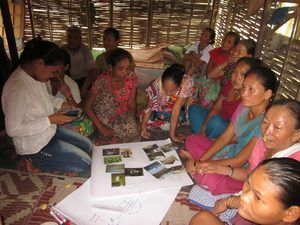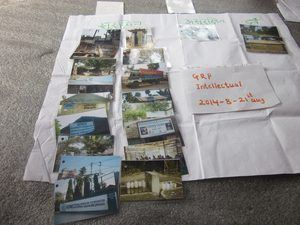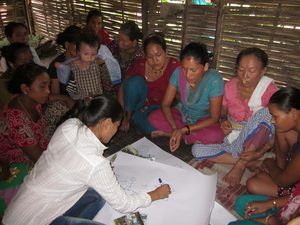Participatory Action with Refugees with Disabilities
Standard approaches to qualitative research often exclude persons with different types of disabilities. In 2013 and 2014, the Women’s Refugee Commission applied a participatory model to examine the intersections of sexual and reproductive health and disability in three refugee settings.

Exploring possible participatory activities with persons with disabilities in the Bhutanese refugee camp in Damak, Nepal
Respecting the Convention on the Rights of Persons with Disabilities and a rights-based framework to research, we engaged a variety of stakeholders—including organizations of persons with disabilities—from the planning and design phase, through to implementing the study and developing recommendations.
In Nepal especially, persons with disabilities played a central role in gathering information from refugee women, men, and adolescents with physical, intellectual, sensory, and psychosocial impairments. To maximize data collector participation, we provided reasonable accommodations, including personal assistants, vehicles for movement, sign language interpreters, documents in Braille, diagrams in tactile ink, and a “supporter” role for data collectors who were blind. Daily debriefings further provided opportunities for collective improvement and reflection. An ongoing, interactive consent process supported the participation of persons with intellectual and psychosocial disabilities, who are so often excluded from these topics, reinforcing their marginalization.

“safe/unsafe” sorting exercise in Nepal-participants sorted the photos depending on whether or not they felt the photographed location was safe, unsafe, or possibly both.
The Women’s Refugee Commission learned much from this inclusive process, including the value of prioritizing process over outcome, capitalizing on untapped strengths, and rethinking the meaning of participation and empowerment. We hope the study offers considerations for other researchers to extend their research—on the part of the study participants and in the research process itself—to operationalize a rights-based, inclusive, and empowering approach to qualitative research.
This blog post by Mihoko Tanabe

Exploring possible participatory activities with persons with disabilities in the Bhutanese refugee camp in Damak, Nepal
You can access this article for free for 30 days starting by using THIS LINK.
After you’ve had a chance to read this piece, please share your thoughts, ideas, or experiences with our community in the comments below so we can continue this discussion!
- Making Public Deliberations Inclusive with Mixed Methods AR - October 26, 2020
- Participatory action research with Aboriginal Elders: Ngulluk Koolunga Ngulluk Koort project - October 12, 2020
- Bringing the relational self to ART: Interview with Dr. Yvonne Skipper - October 1, 2020
